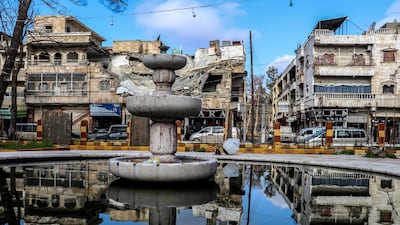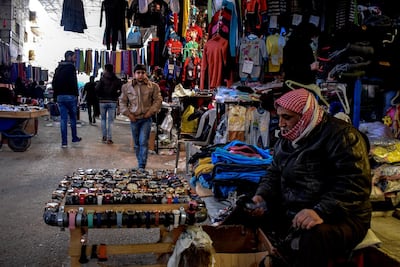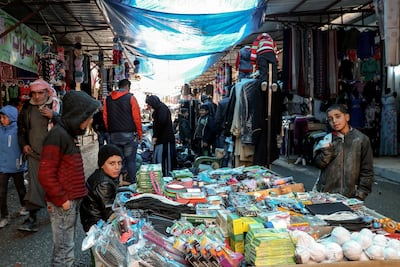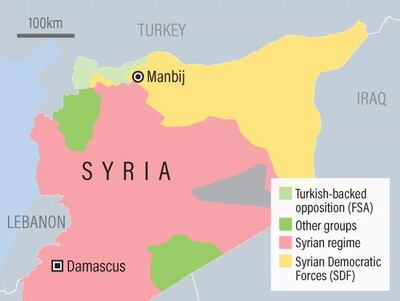The faded yellow posters of Kurdish and Arab fighters killed in the battles against ISIS hang at the entrance of the of Sabaa Al Bahrat square in Manbij, a flash-point Kurdish-held city in Syria located 32 kilometres south of the Turkish border.
On the city's northern flanks, coalition forces continue to conduct patrols. But within the city, the civilian-run Manbij Military Council is still in command.
Life in Manbij this week was nearly the same as it had been since the US-backed Syrian Democratic Forces (SDF) and the People's Protection Units (YPG) drove ISIS from the area in the summer of 2016. The markets are crowded and store owners are going about their business as usual.
But this month’s announcement of a planned US exit from Syria has exposed the YPG and the SDF – Washington’s primary partners in the battle against ISIS – to attacks from Turkey and has raised questions over who will assume control over Kurdish-held parts of Syria once the US withdraws.
Manbij, it appears, is at the heart of this conundrum, with the Syrian government and Ankara both racing to reclaim a city that once served as a launch pad for US-backed operations against ISIS.
With the potential loss of US protection, inhabitants fear an attack that could upend two years of relative stability.
_______________
Read more:
Donald Trump considering delay to US withdrawal from Syria
US Secretary of Defence James Mattis resigns after clashing with Trump
Veteran diplomat Brett McGurk resigns as US envoy to anti-ISIS coalition
_______________
A predominantly Arab city with a pre-war population of about 100,000, Manbij has changed hands many times throughout the course of the eight-year conflict.
Syrian rebels ousted the government from the city in 2012, a year after the start of mass uprisings against the regime of Bashar Al Assad, but eventually lost ground to ISIS about two years later. In 2016, the SDF defeated ISIS and established the MMC – a body comprised of Arabs and Kurds – to administer the area, with backing from the US-led coalition against ISIS.
Now, after more than two years of Kurdish control, the city looks poised to change hands again as US forces prepare to pull out after President Donald Trump’s surprise announcement on December 19.
Turkey has been threatening an imminent military incursion into Manbij, to clear the area of the YPG, a Syrian Kurdish group that is part of the SDF but is designated by Ankara as a terrorist entity.
Before Mr Trump’s announcement, US officials warned Turkey – a key ally and Nato member – against taking action because it would endanger the lives of American soldiers. Then last week, Ankara-backed rebels started massing north of the city in preparation for a potential offensive. Turkish soldiers were also seen gathering on their side of the border and in parts of Syria where they have troop deployments.
In response to threats from rebels, the YPG on Friday invited the Syrian army "to assert control over the areas our forces have withdrawn from, in particularly Manbij, and to protect these areas against a Turkish invasion".
While life continues in the city, people are not immune to their uncertain future.
“People are afraid,” says Adam, a young man working in his father’s convenience shop. “[Afraid] of the [Turkey-backed] Free Syrian Army, but also of the regime.”
It remains to be seen whether the Syrian government or Turkey and its army of Syrian rebels will assume control of the contested area.
Caught between what they see as an impending foreign invasion from the north and west and the return
and the return of an unwelcome regime from the south, the Kurdish leadership faces a tough choice.
“If the [Turkish-backed] rebels enter the city, half the city will flee. If the Syrian Army enters, a quarter will flee,” Shervan Derwish, the MMC spokesman, told The National.
The Syrian army on Friday said that its troops entered the city but the US-led coalition said it had “seen no indication” to support the claim. As of Monday, Syrian solders were nowhere to be found inside Manbij.
Officials with the Syrian Democratic Council, the political wing of the SDF, said they were talking to Damascus about government troops entering the city and how that could protect the area from a Turkish attack.
They say no deal has been struck, but talks began with an agreement that Ankara-backed rebels should not be allowed to enter the city.
Kurdish groups fear Manbij will share the fate of Afrin, about 120km to the west.
Last year Turkey, with the support of Syrian rebels, launched operation Olive Branch, which ended in the capture of Afrin from YPG forces.
The area is now controlled by several rebel groups who often compete for power and influence over the town, which is struggling with lax security and regular terrorist attacks.
The best option, residents say, is for US-backed Kurdish forces to remain.
The SDF and MMC “brought us stability and brought us democracy” says Abu Adel, a resident of Manbij. “They destroyed ISIS for us. The situation is really very stable.”
People in Manbij were just getting used to the security and freedom, he says. Shops were reopening and people could gather outside at night. But once again, people say danger looms.
“They [Turkey-backed rebels] will kill all the Kurds in Manbij.
“Even us Arabs, they will say we are infidels, traitors, PKK, anything,” Abu Adel says, referring to the Turkish-based Kurdistan Workers’ Party (PKK) that Ankara and other countries call a terrorist group.
Hassan, a middle-aged mechanic who owns a tyre repair shop, thinks it might be good if the regime forces entered the city.
“Maybe it will be a new step for stability,” he says.
“We have never had any problem with the Americans. We want them to stay. But the regime soldiers are Syrians, the closest thing to the [Manbij] Military Council,” he explains. “I will give all my sons to the [Syrian] army for the sake of our safety.”
His opinion was not shared by others in the shop. Many young men in Manbij say they fear conscription into the Syrian army and many are still wanted for what the Damascus government calls crimes against the state.
“My whole generation fled conscription,” Hussein, 29, says as he sips coffee downtown. “Most young men in this city are wanted by the regime. If it comes back now, we will never get out of the army.
“At first they’ll be nice to the people but after that, they’ll go back to their old ways.”
Although often hard to verify, in areas recaptured or returned to the state in ceasefire deals, Damascus has arrested people for protesting against the government in 2011, not serving in the military or a litany of other offences – even when agreements include an amnesty.
Mustafa, who came from a nearby town currently under regime control, says he fled to Manbij when the war broke out. He says he will flee again if the regime forces enter the city.
He describes calling a nearby police office a few days ago.
“They told me I have 11 criminal charges against me. Financing terrorism, taking up arms against the government, and so on,” he says.
When asked if he had ever taken part in anti-government activities, he says, “never”.
Mustafa, not his real name, says he left the Syrian army nine years ago, and has not picked up a weapon since.
At the local autonomous administration headquarters in Manbij, the first women’s council conference met last week.
The session – originally meant to address women’s’ participation in local civil life – quickly became an arena for debate and discussion about the city’s future.
The conference began with songs and cheering in the auditorium of a building that just two and a half years ago served as an ISIS prison.
Fatima, a young Arab woman, strikes a defiant tone.
“The Manbij Military Council, we know these people. They are the people of Manbij,” Fatima says. “Their fighters are the fighters of this city.
“We don’t need liberation ... we know these Turkish-backed groups because we lived under them before. Stealing, looting, any girl they like, they take. It was chaos.
“We don’t want any foreign forces to enter here. We want this city and we want to fight for ourselves.”




